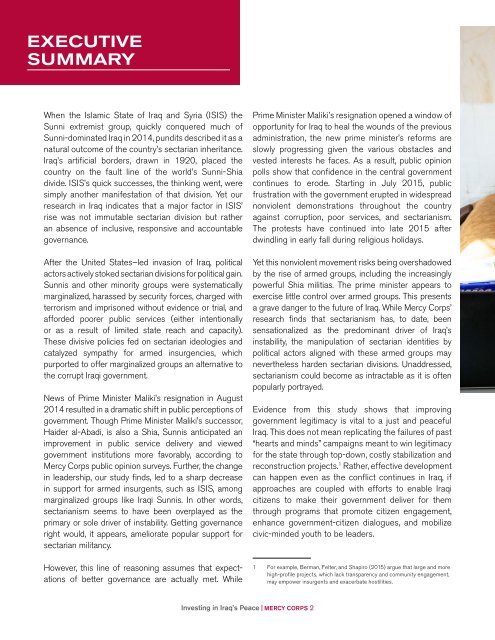INVESTING IN IRAQ’S PEACE
Investing%20in%20Iraqs%20Peace_Final%20Report
Investing%20in%20Iraqs%20Peace_Final%20Report
You also want an ePaper? Increase the reach of your titles
YUMPU automatically turns print PDFs into web optimized ePapers that Google loves.
EXECUTIVE<br />
SUMMARY<br />
When the Islamic State of Iraq and Syria (ISIS) the<br />
Sunni extremist group, quickly conquered much of<br />
Sunni-dominated Iraq in 2014, pundits described it as a<br />
natural outcome of the country’s sectarian inheritance.<br />
Iraq’s artificial borders, drawn in 1920, placed the<br />
country on the fault line of the world’s Sunni-Shia<br />
divide. ISIS’s quick successes, the thinking went, were<br />
simply another manifestation of that division. Yet our<br />
research in Iraq indicates that a major factor in ISIS’<br />
rise was not immutable sectarian division but rather<br />
an absence of inclusive, responsive and accountable<br />
governance.<br />
After the United States–led invasion of Iraq, political<br />
actors actively stoked sectarian divisions for political gain.<br />
Sunnis and other minority groups were systematically<br />
marginalized, harassed by security forces, charged with<br />
terrorism and imprisoned without evidence or trial, and<br />
afforded poorer public services (either intentionally<br />
or as a result of limited state reach and capacity).<br />
These divisive policies fed on sectarian ideologies and<br />
catalyzed sympathy for armed insurgencies, which<br />
purported to offer marginalized groups an alternative to<br />
the corrupt Iraqi government.<br />
News of Prime Minister Maliki’s resignation in August<br />
2014 resulted in a dramatic shift in public perceptions of<br />
government. Though Prime Minister Maliki’s successor,<br />
Haider al-Abadi, is also a Shia, Sunnis anticipated an<br />
improvement in public service delivery and viewed<br />
government institutions more favorably, according to<br />
Mercy Corps public opinion surveys. Further, the change<br />
in leadership, our study finds, led to a sharp decrease<br />
in support for armed insurgents, such as ISIS, among<br />
marginalized groups like Iraqi Sunnis. In other words,<br />
sectarianism seems to have been overplayed as the<br />
primary or sole driver of instability. Getting governance<br />
right would, it appears, ameliorate popular support for<br />
sectarian militancy.<br />
However, this line of reasoning assumes that expectations<br />
of better governance are actually met. While<br />
Prime Minister Maliki’s resignation opened a window of<br />
opportunity for Iraq to heal the wounds of the previous<br />
administration, the new prime minister’s reforms are<br />
slowly progressing given the various obstacles and<br />
vested interests he faces. As a result, public opinion<br />
polls show that confidence in the central government<br />
continues to erode. Starting in July 2015, public<br />
frustration with the government erupted in widespread<br />
nonviolent demonstrations throughout the country<br />
against corruption, poor services, and sectarianism.<br />
The protests have continued into late 2015 after<br />
dwindling in early fall during religious holidays.<br />
Yet this nonviolent movement risks being overshadowed<br />
by the rise of armed groups, including the increasingly<br />
powerful Shia militias. The prime minister appears to<br />
exercise little control over armed groups. This presents<br />
a grave danger to the future of Iraq. While Mercy Corps’<br />
research finds that sectarianism has, to date, been<br />
sensationalized as the predominant driver of Iraq’s<br />
instability, the manipulation of sectarian identities by<br />
political actors aligned with these armed groups may<br />
nevertheless harden sectarian divisions. Unaddressed,<br />
sectarianism could become as intractable as it is often<br />
popularly portrayed.<br />
Evidence from this study shows that improving<br />
government legitimacy is vital to a just and peaceful<br />
Iraq. This does not mean replicating the failures of past<br />
“hearts and minds” campaigns meant to win legitimacy<br />
for the state through top-down, costly stabilization and<br />
reconstruction projects. 1 Rather, effective development<br />
can happen even as the conflict continues in Iraq, if<br />
approaches are coupled with efforts to enable Iraqi<br />
citizens to make their government deliver for them<br />
through programs that promote citizen engagement,<br />
enhance government-citizen dialogues, and mobilize<br />
civic-minded youth to be leaders.<br />
1 For example, Berman, Felter, and Shapiro (2015) argue that large and more<br />
high-profile projects, which lack transparency and community engagement,<br />
may empower insurgents and exacerbate hostilities.<br />
Investing in Iraq’s Peace | MERCY CORPS 2


